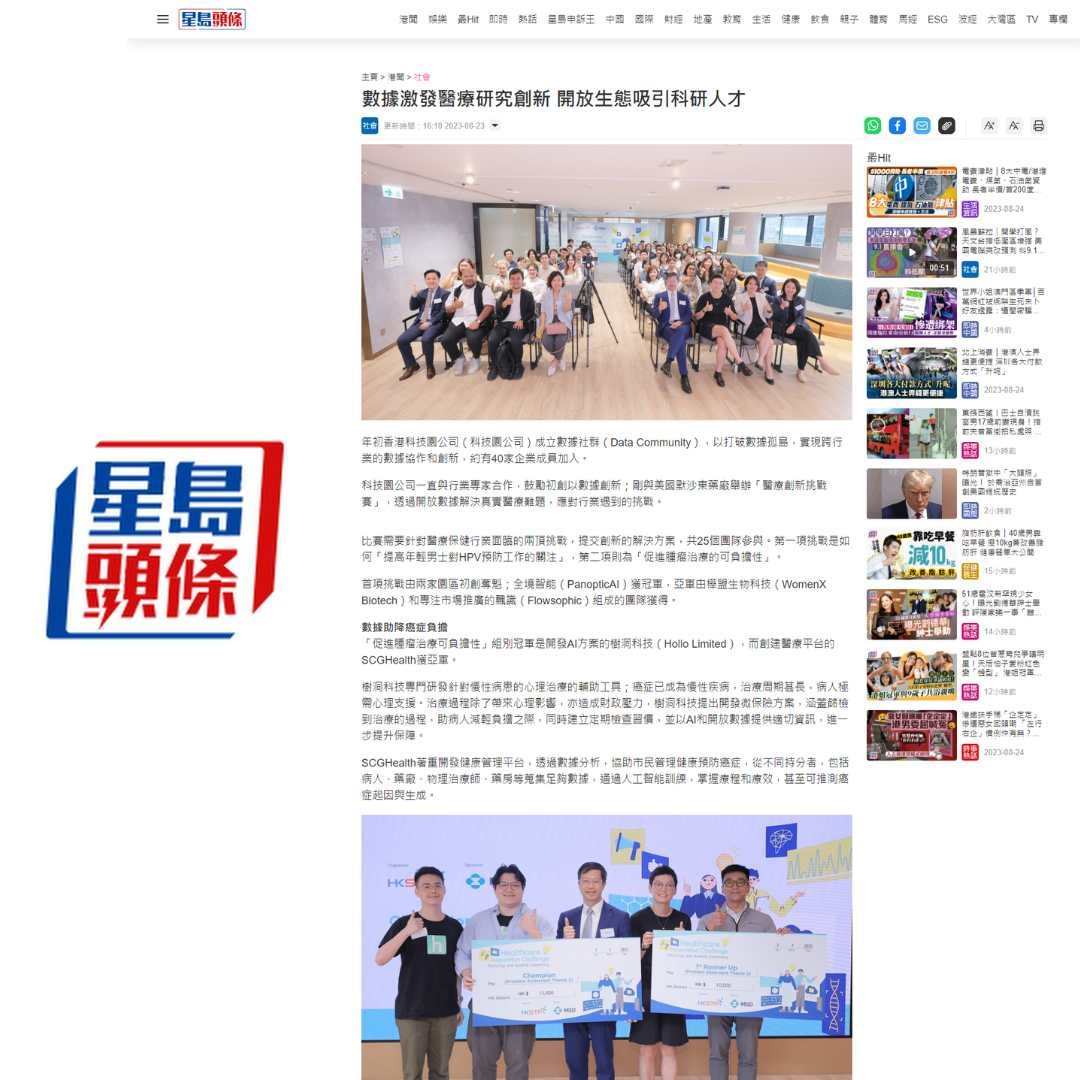Fueled by Innovation, Driven by Results
Cultivating connections, fueling success
Building Bridges to Business Growth
【星島頭條報導】Data Inspires Innovation in Medical Research: Open Ecosystem Attracts Research Talent |

【星島頭條報導】Data Inspires Innovation in Medical Research: Open Ecosystem Attracts Research Talent
Data Community Sparks Medical Research Innovation and Attracts Research Talent Through Open Ecosystem
Earlier this year, Hong Kong Science and Technology Parks Corporation (HKSTP) established the Data Community to break down data silos and enable cross-industry data collaboration and innovation, with around 40 member enterprises joining.
HKSTP has been working with industry experts to encourage startups to innovate using data. Recently, they co-hosted the “Healthcare Innovation Challenge” with Merck & Co., Inc. (MSD), leveraging open data to address real healthcare challenges and industry issues.
The competition required participants to submit innovative solutions addressing two major challenges in the healthcare industry, with a total of 25 teams participating. The first challenge was “How to Increase Awareness of HPV Prevention Among Young Men,” and the second was “Enhancing the Affordability of Oncology Treatments.”
The first challenge was won by two startups from the park. PanopticAI won the championship, and the runner-up was a team formed by WomenX Biotech and Flowsophic, which focuses on marketing.
Data Helps Reduce Cancer Burden
The champion of the “Enhancing the Affordability of Oncology Treatments” category was Hollo Limited, which developed an AI solution, while SCGHealth, which created a health management platform, was the runner-up.
Hollo Limited specializes in developing psychological therapy tools for chronic disease patients. Cancer has become a chronic disease with long treatment cycles, and patients need substantial psychological support. The treatment process impacts mental health and finances, so Hollo proposed a micro-insurance solution covering the process from screening to treatment. This helps patients reduce their burden while establishing regular check-up habits and using AI and open data to provide relevant information, further enhancing protection.
SCGHealth focuses on developing a health management platform that uses data analysis to help people manage their health and prevent cancer. By collecting sufficient data from various stakeholders, including patients, pharmaceutical companies, physiotherapists, and pharmacies, and training it via AI, they can understand treatment processes and efficacy and even predict the causes and formation of cancer.
The champions and runners-up of the “Enhancing the Affordability of Oncology Treatments” challenge group were Hollo Limited (left) and SCGHealth (right), respectively.
Non-Invasive Diagnostic Techniques: Keeping Track of Health Anytime
For the “How to Increase Awareness of HPV Prevention Among Young Men” challenge, both startups developed non-invasive diagnostic technologies.
PanopticAI developed a mobile application called Vitals, which allows users to scan their faces with their smartphone camera to obtain several medical-grade vital signs within 30 seconds, including heart rate and blood oxygen levels. Vitals provides a health monitoring platform for users to check HPV information, make HPV vaccination appointments, and schedule doctor visits. This remote health monitoring solution enables users to easily track their health anytime, anywhere.
WomenX Biotech developed a new type of sanitary pad to address women’s health issues, including detecting cervical cancer through menstrual blood. By combining materials science, cancer research, and biomarkers, the sanitary pad detects cervical cancer biomarkers. For this challenge, WomenX collaborated with Flowsophic to study the relationship between young men and HPV in different groups. They placed vending machines selling male-specific products near high-risk groups and added interactive question features and short videos to promote HPV prevention knowledge. Due to the lack of directly related data in Hong Kong, they used open data and alternative data, such as locations of gyms or bars, to increase opportunities to reach the target groups and deploy promotional activities.
The champions and runners-up of the “How to Increase Awareness of HPV Prevention Among Young Men” challenge group were PanopticAI (left) and the team of WomenX Biotech and Flowsophic (right).
Open Data Drives Innovation
Dr. Lawrence Ho, Director of STP Platform at HKSTP, said that Hong Kong has a lot of open data. For example, the open geospatial data from the Development Bureau helped address the healthcare challenges posed in this competition. The participating teams made full use of open data, increasing public awareness of its potential value and aiding the development of the digital economy.
MSD, a member of the Data Community, used the competition to allow the younger generation to harness the potential of data and propose solutions for the industry. Winning teams may get collaboration opportunities, promoting data-driven innovation.
Dr. Lawrence Ho, Director of STP Platform at HKSTP, said that Hong Kong has the infrastructure and data governance advantages to drive the digital economy.
Data as the Foundation of the “Soft Industry”
Thomas Tang, Managing Director of MSD Hong Kong & Macau, said that Hong Kong has great potential to develop a data economy, especially with the backing of the Greater Bay Area, which can drive the economy as a “soft industry.”
Tang gave examples of how Europe and the U.S. are ahead in open data, showing that concentrating medical data allows big data to reveal relationships between disease incidence and demographic groups, drug efficacy in different age groups, and predict the market value of new drugs. The Greater Bay Area’s more concentrated medical data also presents opportunities for medical research, attracting researchers to Hong Kong.
Dr. Lawrence Ho believes that with the correct public understanding of open data, Hong Kong can become a “safe harbor” for data, providing data trading and acting as a hub for interconnectivity in nearby regions, driving growth in medical research.
Thomas Tang, Managing Director of MSD Hong Kong & Macau, said that Hong Kong, with the backing of the Greater Bay Area, can attract researchers by concentrating medical data.





